He first appeared in front of the cameras at the age of 14, and enjoyed his greatest popularity as Boba Popadić in the television series A Better Life, which represented the last artistic product that brought joy to the former Yugoslavia as a whole. He matured as an actor in the films Pretty Village, Pretty Flame and Wounds, then launched a successful career as a producer and director. He celebrated a football legend in Montevideo, God Bless You and considers the series Balkan Shadows, aka Black Sun, as the biggest creative risk he’s taken. This year represents his greatest success – as producer and director of the film Toma and lead actor in the film and series Impure Blood, based on the literary works of Borisav Stanković.
Initially, while still a child, he was dubbed Sirogojno, after partisan bomber Sava Jovanović Sirogojno who he played in the film Boško Buha, directed by Branko Bauer. As a young man, he gained huge fame nationally for his portrayal of Boba Popadić, the son of Svetlana Bojković and Marko Nikolić in the television series A Better Life. After that, it was difficult to fight to be known as the actor Dragan Bjelogrlić. But he succeeded and he has long been known simply as Bjela, actor, producer and director.
His parents, Tomislav and Nada, both of whom are economists, met in Nada’s native village of Baranda, where Toma, as his friends called him, formed an agricultural cooperative. Dragan’s great-grandfather, Vule Bjelogrlić, from the village of Lipnik near Gacko in Bosnia’s Republika Srpska, fought on the Thessaloniki front in World War I and received land in Banat from King Alexander I Karađorđević. Not wanting to leave his native Herzegovina, he gifted the estate to his eldest son, Milan, who settled in the village of Orahovo in 1926. Together with his wife Ljubica, he had a farmstead where Dragan’s father and uncles were born. His mother’s parents, Veta and Julka Gajić, lived in Baranda, where his grandfather was engaged in the production of opanak shoes.
Dragan was just nine months old when his parents moved from Baranda to Belgrade, or more precisely to Voždovac. He grew up on westerns and crime thrillers, and was the main hero of various adventures at his grandparents’ place in the countryside. Of course, he watched the popular TV series The Written Offs [Otpisane] and loved the characters of Tihi and Prle. At the Milica Pavlović Primary School he was wonderkid, gifted in physics and mathematics. He also attended the drama group of Radio Belgrade, but was thrown out by Bata Miladinović for being mischievous. He graduated from the Sixth Belgrade Gymnasium, enrolled in the Faculty of Civil Engineering, passed the exams of the first year and promptly dropped out.
“I wondered if all that time I’d devoted to mathematics was wasted, but I realised when I started working in directing that it had been important because it compelled me to think in a correct and logical way. And I’m sure that helped me a lot in my first direction jobs”.
Socialism had its shortcomings, but also its good sides… True values were nurtured and the state took care of that, or more precisely provided funds that placed the artists in a rather comfortable situation
He enrolled at the Faculty of Dramatic Arts at the second attempt, in 1984. He recalls that for his first entrance test he prepared Pirandello’s Tonight We Improvise and something from Nušić, but he hadn’t prepared well and wasn’t admitted. The next time he spent several months rehearsing the character of Ljuba Vrapče from Dragoslav Mihailović’s play When Pumpkins Blossomed.
He recalls family gatherings at the Orahovo farmstead, where his relatives and godparents sang about the heroes of Gacko to the sounds of a gusle lute and always highlighted the fact that they were Herzegovinians. “I’m a romantic nationalist and I’ve never expressed that brutally… Don’t be Serbs only by origin, also be Serbs with your soul”. He built an open-air film studio in Baranda, the largest of its kind in Serbia, which is why this place is dubbed the Banat Hollywood. Thanks to Bjela and his brother Goran, Baranda has become a tourist attraction.
“Apart from my basic upbringing, which implies decency and civilised behaviour, I received support from my parents in all key segments of my maturing, but they always gave me room to choose my own life path. I tried to apply the same method in raising my own children.”
Dragan and his wife Maja have been married since 1996 and have two children, 20-year-old son Aleksej and a 24-year-old daughter Mia. And how much did his political affiliations impact on his children? How much did they try to emulate their father? His son is an acting student, while his daughter graduated from the Faculty of Political Sciences and is occasional engaged in political activism. And it is logical for us to ask if she seeks support from her father?
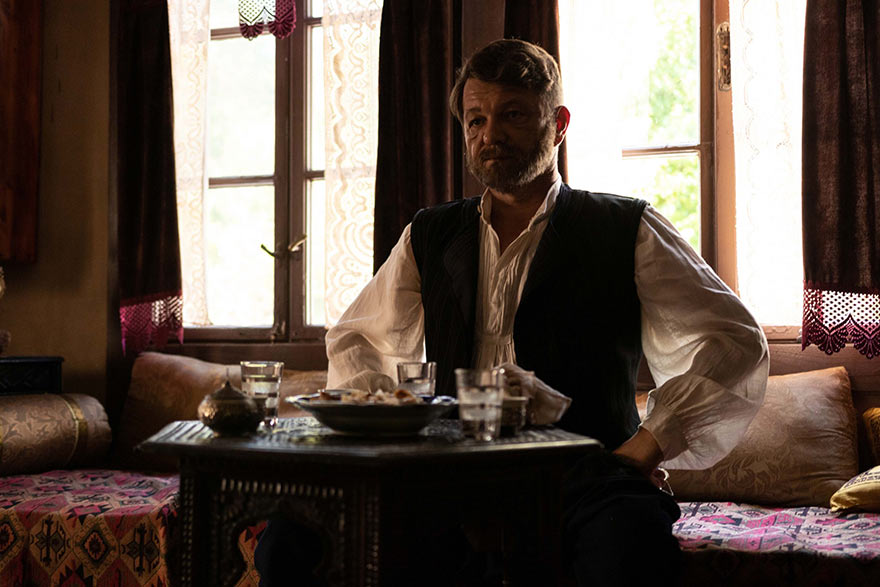
“I hope that my children learned something by observing me. Both my daughter and son have very clearly constructed relationships towards the world and the society in which they live, and I don’t interfere in that much. My wife and I often talk about that with them; we debate, exchange views, and that’s it. My son is studying acting, and I can help him with my experience and knowledge if he wants, but only to the extent that that doesn’t endanger his personal path.”
For Bjela, A Better Life is the most popular series ever made on the territory of the former Yugoslavia. He played Boba, a charming, maturing high school reveller, and when he joined the army, he made friends that will last until the grave, to paraphrase Balašević. Just ten days after this series stopped airing on the territory of Yugoslavia, war broke out. First in Slovenia, then in Croatia, Bosnia… Which is why this series was the last Yugoslav symbol.
“In that series we were searching for a better life, and when it ended and the war started, it happened that a better life was actually described in it. That everything that was better was behind us. When you gain such huge popularity early in your youth – and I achieved the greatest popularity ever in my life with the role of Boba – that is a double-edged sword. When a man is young and popular, he thinks he will remain young and popular forever. Of course, only to quickly meet with the transience of yesterday’s glory, and needing to remain healthy and normal.”
The interwar period, together with World War II, determined and largely established the world in which we live today… That was a time of great visions and great mistakes, the ramifications of which we are still feeling today, especially in the Balkans, and most of all among us Serbs
He hadn’t yet turned 18 when he lost his father, and his mother and older brother took over his care. He has always been close with his brother and everything he’s done professionally, when it comes to production, he’s done together with his brother. Apart from that family connection that helps to more easily overcome any obstacle, he also has his Herzegovinian roots, which he says saved him “from everything bad that could have happened to me after being hit by that great fame in my early youth”.
When he created a production company together with his colleague Nikola Koja in the early 1990s, most of his colleagues did not look favourably on his new calling. He speaks about it today as though it was expected behaviour.
“Socialism had its shortcomings, but also its good sides. One good side was in the fact that true values were nurtured, and that the state took care of that, or more precisely provided funds that placed the artists in a rather comfortable situation in which they didn’t have to take care of themselves, rather the state mainly cared about them. And then came the ‘90s, when the state disappeared and there was no to take care of us. So, we had to organise ourselves, and Kojo and I were among the first to do so.”
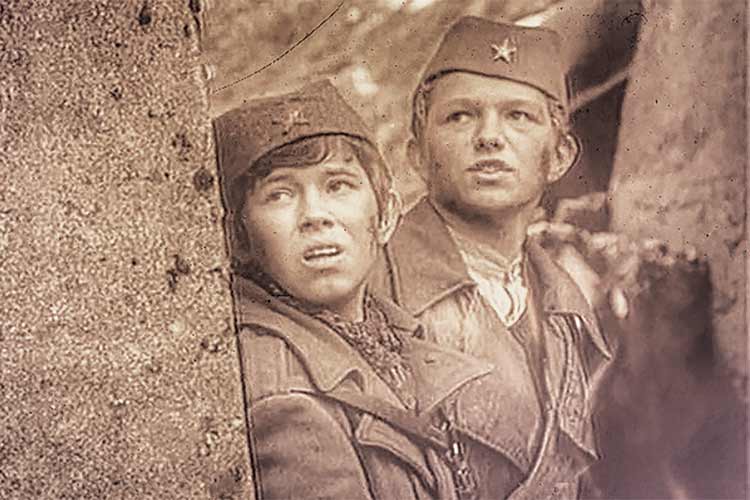
That journey into the world of production was a sure sign that he would also emerge as a director. Perhaps that had been clear to great directorial magician Branko Bauer, who chose him as the character of Sirogojno in the film Boško Buha. He was 14 years old and no one recommended him, rather the great Mr Bauer personally chose him.
“Yes. He chose me for the role. But prior to that I’d gone through a really broad and comprehensive casting process, which included thousands of kids from all over Yugoslavia.”
And what memories does he have of this director; how did he perceive him as a 14-yearold boy, and what does he think of him today, when he is himself a director?
“I was, and remain, impressed by his manners, refinement and delicate gentlemanly calmness, the likes of which can only be found in the novels of Thomas Mann, Stendhal and Solzhenitsyn. As a director, he was simple, emotional and precise. A great figure of ex- YU cinematography and one era. And there’s something else that’s interesting about his story. When I finished shooting for the film Boško Buha, when I was still yet to turn 15, I asked him: ‘Uncle Branko, what do you think, could I be an actor?’ He replied: ‘You can, you can, but you have one eye constantly behind the camera and could also do this job of mine’. He was obviously right, because, even when I was just an actor, I always wanted to know what was happening on the other side of the camera.”
When dealing with our past, which I had to do that for both seasons of the series Black Sun, I was convinced that politics in the Balkans is a special kind of mud, or sludge
The heroes who laid the foundations for the birth of the era of socialism, the partisan heroes who fought against fascism, have in a way survived to this day. It is as if the royalists never managed to create characters that the public would love en masse like the ideologues of the Broz regime did? After all, Bjela himself, like most children of his generation, loved the characters of Tihi and Prle.
“That’s an interesting and accurate observation. The answer is layered and can be given from multiple angles. Firstly, every era has its themes, novels, poetry and movies. The Parisians (communists) used their time well and wisely when it comes to art, and film in particular. Secondly, the partisans were absolutely on the just and right side during the war, while the Royalists, for various reasons, strayed, became confused and made many mistakes. For a start, the King fled the country. That may be understandable from an historical perspective, but for film poetics he can hardly be a hero. More of a sufferer, and the Royalists never start talking from that angle. I could go elaborate, but that’s enough this time.”
The series Balkan Shadows, aka Black Sun, and prior to that the film Montevideo, God Bless You, seem to show that, as an artist, producer and director, Bjela is most interested in the 20th century’s interwar period.
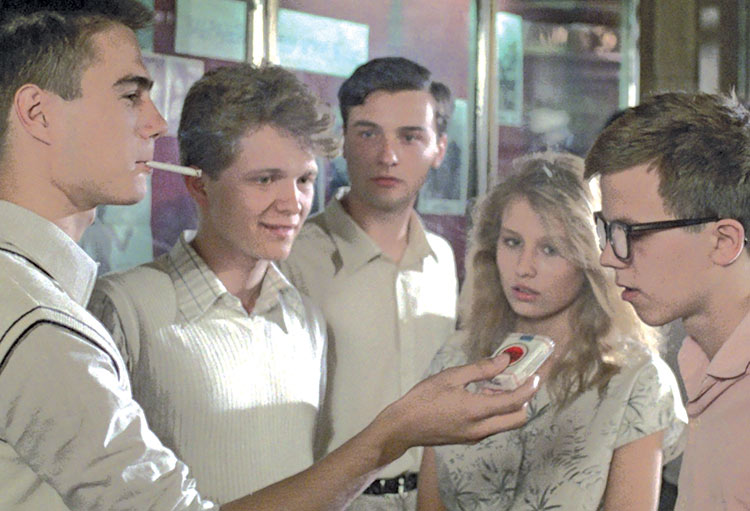
“That’s because it was precisely that time, together with World War II, that determined and largely established the world in which we live today. It was very intense in the troubled era in which communism, fascism, but also globalism, emerged as political visions, and that fact is hinted at through film, music, fashion, sport and, most importantly, the media. That was a time of great visions and great mistakes, the ramifications of which we are still feeling today, especially in the Balkans, and most of all among us Serbs.
“When dealing with our past, which I had to do that for both seasons of the series Black Sun, I was convinced that politics in the Balkans is a special kind of mud, or sludge.”
This actor never hid the fact that his political beliefs lean to the left. But is he less left-wing today than he was in yesteryear?
“On the contrary, I’m more leftist, it’s just that the real left no longer exists today. It will appear someday, in some other form, for certain. And when that happens, the world will again start moving forward. They say that people become more conservative with age and lean towards the political right. But over the years I’ve become increasingly leftist, not today’s liberal leftist, but that trampled leftist who no longer exists. I feel like those retired generals from World War II who spoke about the ideals of communism. I’m almost 58 years old and I spent more than half of my life in a system called socialism. And this second half has been spent in something called wild or liberal capitalism. And I claim responsibly that the former way of life and those values were better. And I can only mourn the fact that there is no political option that would pave the way to nurturing similar values today.”
Over the years I’ve become increasingly leftist, it’s just that the real left no longer exists today. It will appear someday, in some other form, for certain. And when that happens, the world will again start moving forward
Ever since he started dealing with directing and producing, his artistic productivity has been largely dependent on the authorities, on how he’s rated among the structures that distribute money for new projects. He claims that “politics is something foreign to every normal person. Engaging in politics implies a huge amount of insincerity, while engaging in art, which I opted for, implies at least a need for honesty and self-examination.”
Since the time of Slobodan Milošević’s rule and to this day, he has encountered and successfully overcome various problems. What is the most difficult thing in the relationship between Bjela the artist and the government, whichever government that happened to be? When did he find that relationship the most difficult, when was there the most understanding?
“It’s a privilege to be a free man. He says what he thinks. I’ve criticised and reproached every government so far. Of course, some less, some more, depending on how much my views have differed from those in power. But I don’t think I’ve ever been a darling of any government, which is demonstrated in the fact that I’ve never been privileged enough to receive funding from “special funds” or worked on so-called “national projects”, although my films and series are continuously successful, if not the most successful. The most common “signals” were “don’t touch us, do your job and you will be at peace”, but that isn’t in line with my personality. I have always said, and will always say, what I think and feel, and what will be will be. My deeds will defend me.”
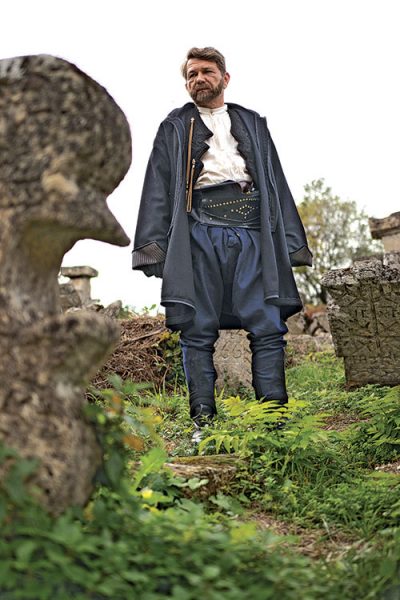
And was Bjela competent enough as a producer to secure part of the money from the government of Milošević’s strongman regime to shoot the films Pretty Village, Pretty Flame and Wounds, both of which poked a direct finger in the eye of that government?
“It’s true that as a producer during the ‘90s I employed various trickery to present these anti-regime films as avant-garde to those from whom we were seeking money. Looking back in hindsight, I can say that back then I cheated those people a little. Because, how could you explain what a movie was like to a big sponsor back in the ‘90s, if you knew that only stateowned companies could seriously help you? So, we had to slightly twist the truth about the intent with which we embarked on making the film. For me, those were interesting life and artistic experiences. On the other hand, people everywhere, especially in Croatia and Slovenia, have asked me how it was possible that we made such films with the help of such a regime.
“Today, I can say how that was a time of absurdity in which such important films were made that show how the Serbian cinematography of the 1990s was much more important than it is today. The films that we are left with from that time have serious aesthetics and artistic content, and had viewing figures of half a million and upwards.
“My recollections of that time aren’t sparkling, like the majority of us, but not everyone was an idiot, nor was everything black and white. I will tell you, for example, that Radovan Stojčić Badža, the Serbian police general, chief of the public security service and finally Serbia’s acting interior minister, made it possible for the entire technical equipment to be transferred to Bosnia for the filming of Pretty Village, which was practically impossible at the time. That man and I later found ourselves on opposite sides, when I was among the demonstrators and he sent police officers against me, against us. And then it happened that that man was murdered, so out of a sense of gratitude I attended his funeral, which provided reason for yet another interpretation of my controversy.
When we look back today on what we’ve done over the last twenty years, the facts, unfortunately, are clear – both the authors and the films made in the 1990s were better than the ones we have today. And the state, absurdly, helped films much more, even though that didn’t help it at all. We don’t have a single propaganda film about that regime, unlike our neighbours who really stood out when it came to the so-called regime film. And, in my opinion, the film Pretty Village, Pretty Flame is absolutely the greatest artistic achievement of the last thirty years.”
I have always said, and will always say, what I think and feel, and what will be will be. My deeds will defend me
Regardless of how much Bjela occasionally promotes himself with impressive theatre roles, his priorities are undoubtedly film and television. Is it difficult for him today when performing as an actor while someone else directs a film or series? Or does he prefer to determine what and how others will perform?
“No, it’s not difficult at all. I’ve been acting for more than 40 years and it is my primary profession. Actually, I can always hardly wait for someone to direct me. Now, my experience as a director, and my many years of acting experience, help me to be able to feel whether things are going well for a director or not. And then I state my opinion and stop at that. If he heard me, okay, if not, I continue working. I never interfere in directing when I’m acting.”
Bjela marked this year with his exceptional role in Milutin Petrović’s film Impure Blood, and his direction of the film Toma, about the life of singer Toma Zdravković. How much is he able to defend the Impure Blood character of Hadži Trifun, that typical Serbian boss and man of power, who lives from the manifestation of that power, especially towards women?
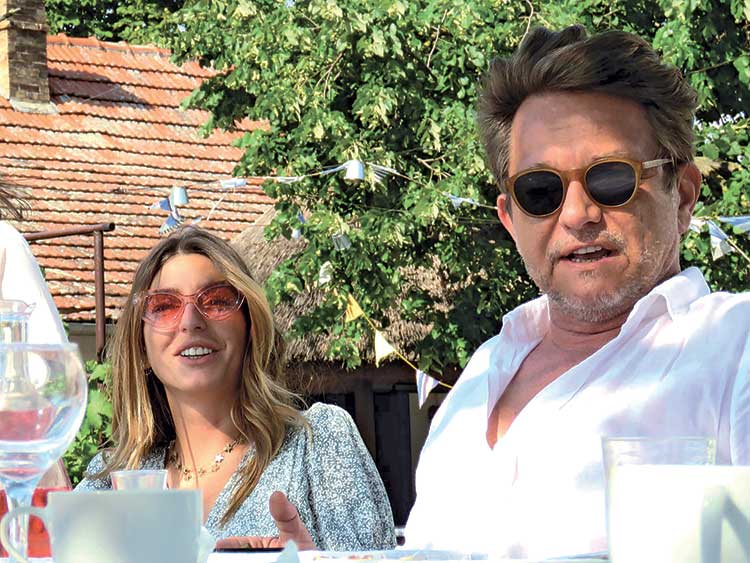
“I think you have simplified the character of Hadži Trifun. That is a very complex character, just as the literary works of Bora Stanković are layered and complex. It was a great task, a great character and very nice cooperation with Milutin Petrović.”
And was there some personal, deeply intimate event that prompted him to direct a film about the singer Toma Zdravković? What bound Bjela to him? Or was he just convinced that the public would come to love such a film?
“Toma Zdravković’s songs have always filled me with some unusually beautiful sadness. I tried to discover and reveal that strange feeling by dealing with his sad and unusual life, which he sang of so beautifully in his songs.”
Bjela has won the top professional awards, and he isn’t stopping with his work. He will soon turn 56, on 10th October to be precise. What does he consider as his greatest professional achievement, and what is his greatest satisfaction at this moment?
“I consider my great achievement the fact that, I think, I succeeded in ensuring my professional advancement followed my maturing in life. I tried to be aware of my mistakes and correct them, both in life and in my profession. And my greatest success is my wife, whom I love, and who has helped me to have a happy and wonderful family, despite the many challenges that are often imposed by the life of an artist.”